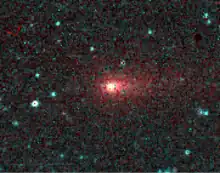62P/Tsuchinshan
62P/Tsuchinshan, also known as Tsuchinshan 1, is a periodic comet discovered on 1965 January 1 at Purple Mountain Observatory, Nanking.[1] It will next come to perihelion on 25 December 2023 at around apparent magnitude 8.[3]
 | |
| Discovery | |
|---|---|
| Discovered by | Purple Mountain Observatory, Nanking |
| Discovery date | January 1, 1965 |
| Orbital characteristics | |
| Epoch | 2005-Jul-09 (JD 2453560.5) |
| Aphelion | 5.568 AU (Q) |
| Perihelion | 1.489 AU (q) |
| Semi-major axis | 3.528 AU (a) |
| Eccentricity | 0.5780 |
| Orbital period | 6.63 yr[1] |
| Inclination | 10.50° |
| Last perihelion | 2017-Nov-16[2] 2011-Jun-30[3][4] (unobserved) |
| Next perihelion | 2023-Dec-25[2][5] |
During the 2004 perihelion passage the comet brightened to about apparent magnitude 11.[6] The comet was not observed during the 2011 unfavorable apparition since the perihelion passage occurred when the comet was on the far side of the Sun.
On 2049 April 1 the comet will pass about 0.016 AU (2,400,000 km; 1,500,000 mi) from Mars.[1]
See also
References
- "JPL Small-Body Database Browser: 62P/Tsuchinshan 1" (last observation: 2005-06-07; arc: 20.75 years). Jet Propulsion Laboratory. Archived from the original on 2012-12-13. Retrieved 2012-03-02.
- "62P/Tsuchinshan Orbit". Minor Planet Center. Retrieved 2014-06-16.
- Seiichi Yoshida (2010-11-28). "62P/Tsuchinshan 1". Seiichi Yoshida's Comet Catalog. Retrieved 2012-03-02.
- Syuichi Nakano (2008-05-04). "62P/Tsuchinshan 1 (NK 1604)". OAA Computing and Minor Planet Sections. Retrieved 2012-03-02.
- "Horizons Batch for 62P/Tsuchinshan 1 (90000668) on 2023-Dec-25" (Perihelion occurs when rdot flips from negative to positive). JPL Horizons. Archived from the original on 2022-06-27. Retrieved 2022-06-27. (JPL#K174/11 Soln.date: 2021-Mar-23)
- Seiichi Yoshida (2005-06-10). "62P/Tsuchinshan 1 (2004)". Seiichi Yoshida's Comet Catalog. Retrieved 2012-03-02.
External links
- Orbital simulation from JPL (Java) / Horizons Ephemeris
- 62P/Tsuchinshan 1 – Seiichi Yoshida @ aerith.net
- Elements and Ephemeris for 62P/Tsuchinshan – Minor Planet Center
- 62P/Tsuchinshan at the Minor Planet Center's Database
- 62P/Tsuchinshan – Kazuo Kinoshita (2006 Oct. 10)
- 62P – Gary W. Kronk's Cometography
This article is issued from Wikipedia. The text is licensed under Creative Commons - Attribution - Sharealike. Additional terms may apply for the media files.

.png.webp)